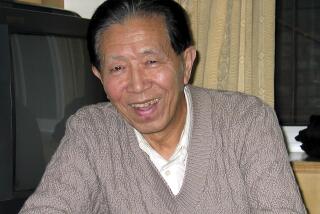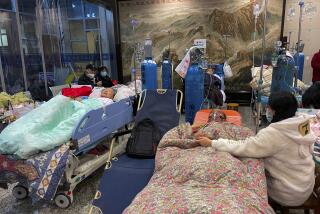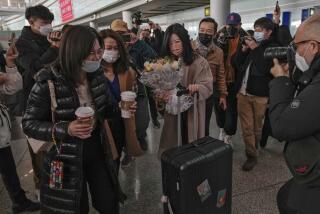Inspectors to Comb China for Unreported Cases of SARS
- Share via
BEIJING — In a bid to halt the spread of the SARS virus in China’s vast hinterland, the government dispatched legions of inspectors Tuesday to fan out across the country, combing hospitals, farms and government records for unreported cases of the disease, state media reported.
The teams will travel to remote areas where experts fear health-care facilities are inadequate to stem the spread of severe acute respiratory syndrome. Vice Premier Wu Yi, in charge of Beijing’s efforts to combat SARS, briefed the departing inspectors.
In another move aimed at preventing the disease from spreading, Beijing’s school board announced today that all public schools in the city will be closed for two weeks starting Thursday. The order affects all 1.7 million students, even if no cases have been reported in their schools.
Tuesday was only China’s second day of full-scale mobilization against SARS, following the weekend firings of Health Minister Zhang Wenkang and Beijing Mayor Meng Xuenong.
The dismissals came as the government admitted it had woefully underreported SARS statistics. As of Tuesday, China was reporting far higher figures than a few days earlier: 2,158 confirmed cases of SARS and 97 fatalities. According to state statistics, there were also 918 suspected cases of the disease.
In Hong Kong, where nearly half the global death toll of more than 220 has occurred, health authorities Tuesday announced 32 new confirmed SARS cases and five additional deaths during the previous 24 hours. The new figures brought the region’s death toll to 99 since the disease was detected.
Hong Kong Health Secretary Yeoh Eng-kiong said that the new cases involved either health-care workers or other people who had had direct contact with SARS patients. Four of the five deaths involved people in their 80s already weakened physically by chronic disease.
At a news conference, Yeoh appeared to discourage hopes for any quick eradication of the disease.
“What we see is this virus will be with us for some time,” he said. “We do not anticipate that it will be eradicated completely because it is highly infectious.”
At the invitation of Shanghai officials, a World Health Organization team spent a second day Tuesday inspecting medical facilities in China’s largest city, a teeming metropolis of about 14 million that so far has reported only two cases of SARS.
State media, meanwhile, published a central government notice instructing each locality and enterprise to form a disease prevention committee under the command of local government and party officials.
The move was aimed at resolving the tangle of overlapping jurisdictions in China, where army units, ministries, provinces and cities all have their own medical facilities. While admitting to having ineffectively handled the crisis, China’s Health Ministry put part of the blame on such bureaucratic chaos.
The notice was dated April 18, a day after China’s ruling body, the Communist Party’s nine-member Politburo Standing Committee, decided to reverse its previous policy of denial and to punish officials accused of a cover-up.
The leadership realized that SARS, as the notice put it, “affects China’s national interests and international image.”
The notice also called on the media to amply publicize information on the disease and its prevention. But it noted that the media “should at the same time be careful to correctly guide public opinion, dispel people’s worries and stabilize their minds.”
China’s state-run news outlets responded with a second day of saturation SARS coverage, featuring glowing profiles of “white-clad angels” apparently intended to cheer up frightened medical staff. The Health Ministry said that health-care workers have made up one-quarter of China’s SARS cases.
Newspaper columns full of hotline numbers for reporting new SARS cases vied for space with ads for air purifiers.
In Hong Kong, where health-care workers have also been hard hit, Chief Executive Tung Chee-hwa told Hospital Authority administrators and front-line medical and nursing staff that he would request $25 million in additional funding for further training and study on the disease.
China’s State Food and Drug Administration and other authorities issued emergency notices for inspectors to be on the lookout for speculators in medical supplies and for hoarding of antibiotics, herbal medicines and other drugs.
Many stores in Beijing have been sold out of surgical masks, disinfectants and cold remedies for days, with some residents reporting price gouging and the sale of counterfeit goods.
Authorities also continued discouraging vacationers from intraprovincial travel to keep the disease from spreading, after China’s Cabinet decided to cut the traditional weeklong May 1 holiday down to three weekdays -- although combined with the following weekend it will still be a five-day holiday.
In Beijing, the local legislature approved the resignation of Meng Xuenong as mayor, according to official news accounts. The move was a face-saving formality, as the Communist Party had already stripped him of his more important post as Beijing’s deputy party secretary.
“Actually, instances of false reporting are numerous most of the time,” said one cyber-visitor to the People’s Daily Strong Country Forum chat room.
“Mr. Meng was just unlucky,” the correspondent wrote, echoing a common view in the capital.
*
Special correspondent Kuhn reported from Beijing and Times staff writer Marshall from Hong Kong.
More to Read
Sign up for Essential California
The most important California stories and recommendations in your inbox every morning.
You may occasionally receive promotional content from the Los Angeles Times.










